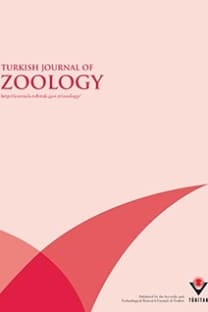New Rumen Ciliates from Turkish Domestic Cattle ( Bos taurus L.): 2. Epidinium graini n. sp. (Ophryoscolecidae, Entodiniomorphida)
In the course of examining rumen contents obtained from 30 domestic cattle ( Bos taurus L.) in the vicinity of İzmir, Turkey, somewhat similar but unusual forms of epidinia were observed. These ciliated protozoa were observed in six of the animals with a frequency of 20.00%, and this study is concerned with their classification into a species, Epidinium graini n. sp. All the protozoa identified as belonging to this species were divided into three formae, E. graini f. graini n. f., E. graini f. caudatricoronatum n. f. and E. graini f. caudaquadricoronatum n. f.. These species have 2-4 transversally periplasmic pellicle foldings resembling coronets or skirts in shape and 4-5 longitudinal groovelets extending posteriorly from the mid-level of the body on the left surface. These or similar characteristics had been described not in the genus Epidinium but in the genus Ophryoscolex. This fact may stem from some of the characteristics showing the phylogenetic relationship between these two genera.
Anahtar Kelimeler:
Epidinium graini n. sp., New Rumen Ciliates, Bos taurus.
New Rumen Ciliates from Turkish Domestic Cattle ( Bos taurus L.): 2. Epidinium graini n. sp. (Ophryoscolecidae, Entodiniomorphida)
In the course of examining rumen contents obtained from 30 domestic cattle ( Bos taurus L.) in the vicinity of İzmir, Turkey, somewhat similar but unusual forms of epidinia were observed. These ciliated protozoa were observed in six of the animals with a frequency of 20.00%, and this study is concerned with their classification into a species, Epidinium graini n. sp. All the protozoa identified as belonging to this species were divided into three formae, E. graini f. graini n. f., E. graini f. caudatricoronatum n. f. and E. graini f. caudaquadricoronatum n. f.. These species have 2-4 transversally periplasmic pellicle foldings resembling coronets or skirts in shape and 4-5 longitudinal groovelets extending posteriorly from the mid-level of the body on the left surface. These or similar characteristics had been described not in the genus Epidinium but in the genus Ophryoscolex. This fact may stem from some of the characteristics showing the phylogenetic relationship between these two genera.
Keywords:
Epidinium graini n. sp., New Rumen Ciliates, Bos taurus.,
- ISSN: 1300-0179
- Yayın Aralığı: Yılda 6 Sayı
- Yayıncı: TÜBİTAK
Sayıdaki Diğer Makaleler
A Taxonomical Study on the Rotifer Fauna of Yedigöller (Bolu-Turkey)
Freshwater Isopod Species (Crustacea) of Turkish Thrace and Their Distribution
Temel ŞAHİN, Bilal AKBULUT, Muharrem AKSUNGUR
A Histochemical Study of the Origin Regions of the Triceps Muscle of the Sparrow (Passer domesticus)
Köyceğiz-Dalyan Özel Çevre Koruma Bölgesinde Bulunan Yuvarlakçay’ın Su Kalitesinin Değerlendirilmesi
Nilgün KAZANCI, Muzaffer DÜGEL
A Study on the Fishes of Edremit Bay (Aegean Sea) Hatice TORCU, Zeliha AKA
Department Of ZOOLOGY, Faculty Of Science And ARTS, Balıkesir UNİVERSİTY
